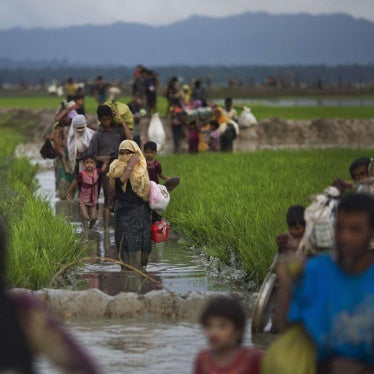(New York) - The International Criminal Court (ICC), by issuing an arrest warrant for Muammar Gaddafi, signaled that the law can reach even those long thought to be immune to accountability, Human Rights Watch said today. The ICC judges granted warrants on June 27, 2011, for Gaddafi, the Libyan leader, his son Seif al-Islam, and Libya's intelligence chief, Abdullah Sanussi. They are wanted on charges of crimes against humanity for their roles in attacks on civilians, including peaceful demonstrators, in Tripoli, Benghazi, Misrata, and other Libyan cities and towns.
Issuing the warrants was an important step to providing the victims of serious crimes in Libya the chance for redress. Despite concerns that an arrest warrant against Gaddafi would act as an obstacle to finding a solution to the conflict in Libya and thus discourage the Libyan leader from relinquishing power, it is unlikely that there is a connection between the ICC investigation and Gaddafi's refusal to step down, Human Rights Watch said.
"Muammar Gaddafi already made clear he intended to stay until the bitter end before the ICC process was set in motion, and his son's February vow to ‘live and die in Libya' speaks for itself," said Richard Dicker, international justice director at Human Rights Watch. "It beggars belief that a dictator who has gripped power for over 40 years would be frozen in place by this arrest warrant."
Human Rights Watch documented the arbitrary arrest and disappearance of scores of people, as well as instances in which government forces opened fire on peaceful demonstrators after the start of anti-government protests in eastern Libya on February 15.
Following the court's issuance of arrest warrants, initiatives aimed at ending the devastating conflict in Libya are important, but justice should not be abandoned as other objectives are pursued, Human Rights Watch said.Human Rights Watch research in countries such as Sierra Leone and Angola shows that the failure to hold perpetrators of the most serious international crimes to account can contribute to future abuses.
The record from other conflicts also shows that arrest warrants for senior leaders can actually strengthen peace efforts by stigmatizing those who stand in the way of conflict resolution. For example, the indictments of Radovan Karadzic and Ratko Mladic by the International Criminal Tribunal for the former Yugoslavia are credited with keeping them sidelined during the Dayton peace talks, which led to the end of the Bosnian war.
The ICC is tasked with bringing to justice those most responsible for war crimes, crimes against humanity, and genocide. It must act independently and apolitically to fulfill its mandate, Human Rights Watch said. In parallel, other actors have a vital role to play in resolving the crisis in Libya, including through diplomatic and humanitarian activities.
"As a judicial undertaking, the court's work is distinct from the military and diplomatic initiatives unfolding in Libya and it would be a mistake to conflate them," Dicker said. "Justice, to be credible, must run its independent course."
The ICC prosecutor had asked the judges of the court on May 16 to issue warrants for the three Libyan suspects. Libya, though not a party to the Rome Statute that created the court, is subject to ICC jurisdiction through United Nations Security Council resolution 1970.
Because the ICC has no police force of its own, it depends on national authorities to make arrests on its behalf. Resolution 1970 requires the Libyan authorities to cooperate fully with the court. In April, the opposition authority in Libya, the Interim Transitional National Council, promised to cooperate with the ICC in a letter to the Prosecutor's Office.
Any suspect who is arrested or who surrenders to the court has an opportunity to object to the charges and to challenge the evidence in a "confirmation of charges" hearing. At that point, the ICC judges must decide whether the evidence available is sufficient to establish "substantial grounds to believe" that the person committed each of the crimes charged. If they decide it is sufficient, the case can move forward to trial.
Human Rights Watch has documented serious and systematic violations of the laws of war by Libyan government forces during the current armed conflict, including repeated indiscriminate attacks in residential neighborhoods in Misrata and towns in the western Nafusa mountains. Human Rights Watch has also documented human rights abuses by rebel forces.
On June 1, an International Commission of Inquiry for Libya set up by the UN Human Rights Council released its report, concluding that both government and rebel forces committed acts amounting to war crimes. The commission investigated reports that NATO forces were involved in indiscriminate attacks against civilians, but concluded that it had not seen evidence to suggest that NATO forces had intentionally targeted civilian areas or engaged in indiscriminate attacks on civilians.
Security Council resolution 1970 says that nationals from states outside Libya that are not parties to the ICC statute are not subject to ICC jurisdiction for all alleged acts arising out of operations in Libya established or authorized by the Security Council. A number of countries have provided notice about their participation in military operations under another Security Council resolution, Resolution 1973, which authorizes member states "to take all necessary measures" to protect civilians in Libya. All countries which have provided notice, including non-state parties to the ICC, remain obligated under international law to investigate and prosecute any members of their armed forces implicated in war crimes.
In addition to the current case against the three Libyan suspects, Human Rights Watch urged the ICC prosecutor to continue to investigate serious crimes that may have been committed by any party during the armed conflict in Libya. Security Council resolution 1970 gives the ICC ongoing jurisdiction over war crimes and crimes against humanity committed on the territory of Libya since February 15, 2011.






